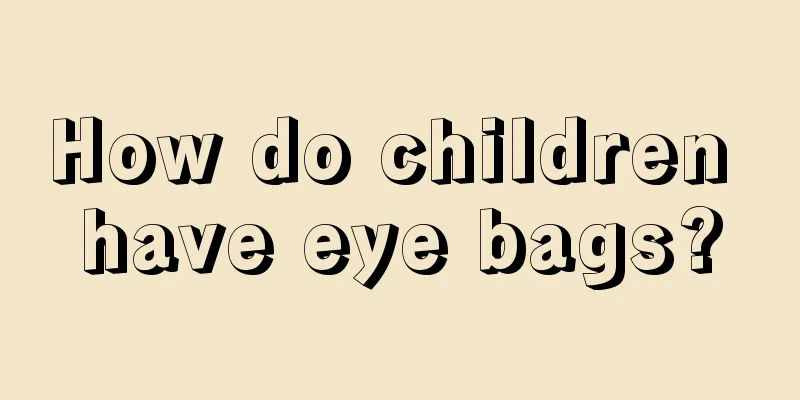Why does my child always have nosebleeds?

|
After seeing their children bleeding from the nose, parents will be very anxious. In addition, many children will be very scared when they have symptoms of nosebleed, so both parents and children may panic. This approach is definitely wrong. You must not panic when your child has a nosebleed. If your child has a nosebleed for a long time, it is best to go to the hospital for a check-up. The most common causes are the following. Why does my child always have nosebleeds? Local causes: 1. Trauma; 2. Deviated nasal septum, ridge, calcarine process; 3. Tumors of the nasal cavity, paranasal sinuses, and nasopharynx. Systemic causes: Systemic diseases that cause increased arterial or venous pressure, bleeding and coagulation disorders, or changes in vascular tone may cause nosebleeds. Nasal lesions: 1. Any trauma to the nose can cause nosebleeds. Particularly worth mentioning here is nose picking. Bleeding may not occur immediately after picking your nose. In fact, after picking your nose, the nasal mucosa has been damaged without being noticed. However, nosebleeds may occur as soon as there is an opportunity, such as when living, moving, or even sleeping, because the damage to the nasal mucosa has already laid the foundation for nosebleeds, which is indeed something the person with bleeding did not expect when he picked his nose. 2. Septal deviation: Clinically, the site of nose bleeding is mostly at the ridge or calcarine process of the deviated nasal septum. Because the mucous membrane in this area is thin and easily affected by the air and becomes dry, small blood vessels may rupture and bleed. Among various nasal neoplasms, capillary hemangioma and nasopharyngeal microangioma are the most common. 3. It is common for children to stuff buttons, hard plastic objects, or small metal items into their nasal cavity. The former causes unilateral nosebleeds, while the latter causes bilateral nosebleeds. It is common for children to put buttons, hard plastic objects, or small metal objects into their nasal cavities. 4. Tonsillar hypertrophy is one of the causes of nosebleeds in children, which is mostly caused by induced inflammatory lesions and congestion of the nasal mucosa. Systemic lesions: Nosebleeds caused by systemic diseases are called symptomatic nosebleeds. They are often the first symptom of certain systemic diseases in the nose and should be treated with special vigilance. Purpura of hemorrhagic constitution, aplastic anemia, various types of leukemia, scurvy, true or secondary polycythemia, hemophilia, pernicious anemia, etc. These are relatively common diseases in children and should never be taken lightly, as they delay the best time for treatment. Certain acute febrile infectious diseases, respiratory tract infections, influenza, measles, malaria, scarlet fever, typhoid, typhus, mumps, etc. It is mostly due to high fever caused by illness. The blood vessels in the nasal mucosa are stimulated by inflammatory substances, causing severe congestion, swelling, and dryness, causing capillaries to rupture and bleed. This usually occurs during the high fever period of the illness. In addition, hemorrhagic fever can also cause severe bleeding; whooping cough, due to its frequent and severe coughing, can increase venous pressure, causing blood vessel rupture and bleeding. Nutritional disorders and vitamin deficiencies such as lack of vitamin C, K, P or calcium can cause bleeding. Vitamin C and P can keep the capillary walls somewhat brittle and permeable. Vitamin K is related to the formation of prothrombin. Calcium is also an indispensable element in the coagulation process. When these substances are lacking in the body, bleeding symptoms including nosebleeds may occur. |
<<: Will children have nosebleeds when they get angry?
>>: Is it normal for children to have nosebleeds when they have a fever?
Recommend
What to do if a child has a low fever of 35 degrees 4
It is a very bad phenomenon for a baby to have a ...
Ten-year-old boy sweats while sleeping at night
Children's body temperature is higher than th...
Nursing measures for infantile labia adhesion
Every child is born healthy, but many babies will...
Why does my five-month-old baby keep shaking his head when sleeping?
Every child’s situation is different, and parents...
What are the symptoms of baby teething?
Babies have different behaviors at each stage of ...
Why does a child's tongue coating turn black?
The health of children is what every parent cares...
How old does a baby start to smile?
How old does a baby have to be before he or she c...
What should I do if my baby keeps vomiting and even drinks water?
Parents with children at home fear most that thei...
Can childhood asthma be cured?
The incidence of asthma is very high around the w...
How to educate a three-year-old boy
Nowadays, parents pay special attention to their ...
What should I do if my baby's lips suddenly turn purple?
Everyone should have had this experience: on cold...
The best time to correct children's flat feet
In life, many children suffer from congenital fla...
What are some ways to improve children's memory?
I believe that we will all find such a problem in...
What to do if baby has eczema and ulcers
Baby's eczema ulcers and water discharge can ...
When do children lose their teeth?
The time when children's teeth change is a pr...









